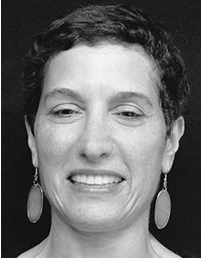POETS & WRITERS IS MORE than a magazine. We are a nonprofit organization that puts money directly into the hands of writers who give readings and lead workshops in museums, prisons, homeless shelters, libraries, and senior centers. Your subscription to Poets & Writers Magazine supports the all-important work of cultivating literary activity in urban and rural communities throughout the United States.
The Write Treatment
Emily Rubin is the author of the novel Stalina (Mariner Books, 2011). Her short stories have been published in Confrontation, the Red Rock Review, and HAPPY. She is currently working on another novel. In 2011 she began a program of creative writing workshops for cancer patients, survivors, and caregivers at Beth Israel Medical Center in New York City. The workshops are funded in part by Poets & Writers’ Readings/Workshops program, with additional support from the Lower Manhattan Cultural Council and the New York Community Trust.
 During my treatment for cancer in 2008 and 2009, I kept a diary but put much of my writing, including a novel, on hold. When I resumed my daily writing practice, I recognized and appreciated what W. Somerset Maugham described as the “supreme solace” of writing.
During my treatment for cancer in 2008 and 2009, I kept a diary but put much of my writing, including a novel, on hold. When I resumed my daily writing practice, I recognized and appreciated what W. Somerset Maugham described as the “supreme solace” of writing.
A year after I completed chemo and radiation my novel was accepted for publication, and I thought I could leave my life with cancer behind and get back to being a writer. Instead, I found the illness was still present, not in my body but most certainly in my psyche. Tests for a possible relapse, fortunately negative, brought up fear and anxiety. During treatment, I relied on Beth Israel Medical Center’s social-work and patient-advocacy staff to help me navigate the roller coaster of cancer using the hospital’s programs for psychological counseling, nutrition advice, and access to free massage, yoga, and acupuncture.
The idea of offering writing workshops came to me as a way to give back to the community and present those affected by cancer an opportunity to take a break from the illness. Life with cancer requires taking chances, making hard choices, being fierce and vulnerable—all important parts of a writing life, too. Through the writing workshops I hoped to provide an additional and unconventional way to process and heal.
I met with Alison Snow, Beth Israel’s coordinator of social-work services, and Sandy Lansinger, the hospital’s patient advocate. They loved the idea and offered their support. I had previously received funding from Poets & Writers’ Readings/Workshops Program (East), so I approached program director Bonnie Rose Marcus, who was also enthusiastic and encouraged me to apply for funding. When it came through, Snow and Lansinger distributed flyers, referred patients, and placed listings in monthly hospital calendars. The first day of the workshop six people came, many of whom have continued to participate over the past two years: Jenna, a nurse; Phillipa, a graphic designer; Jonah, a young man on disability struggling with cancer and HIV; Cora, an illustrator; Ella, an actress and playwright; and Melanie, a published poet and victim-services advocate. They were young and old, a group as diverse as the passengers on a city bus—each in various stages of treatment, remission, or dealing with chronic disease.
My syllabus includes writing prompts, quotes, and photographs that I find evocative and hope will inspire others. I encourage the participants to write about anything they choose, and I hope the workshop can be a place to take a moment away from waiting rooms and procedures. They are welcome to write about illness, but I find that many take the much-needed furlough from it all. I provide notebooks and pens, and after a brief discussion and a collective breath, we write for twenty-five to thirty minutes.
Writing prompts include “How did you get your first name?” and “A flat tire, a button, and sliced tomatoes.” That last prompt, a list of random items, is often one of the most inspiring: Each item acts like a signpost for the writer and focuses the details of the story.
Sighs are heard; squinting eyes and furrowed brows are seen around the room as the wheels spin and pens start to glide across pages of the blank notebooks. At the end of the writing session everyone is amazed by how many pages have been filled in such a short time. Excited to share the results, we listen to narratives that span the literary landscape.
Whether biography, fiction, poetry, or fantasy, the stories that emerge are fierce, funny, angry, touching, and profane. It is a thrill to see the collective imagination so quickly engaged. A sense of empowerment, freedom, and community is evident in the laughter, tears, and heightened energy that take over the room. For me, this can feel like magic, and it is always inspiring.
Photo Credit: Al Naclerio






